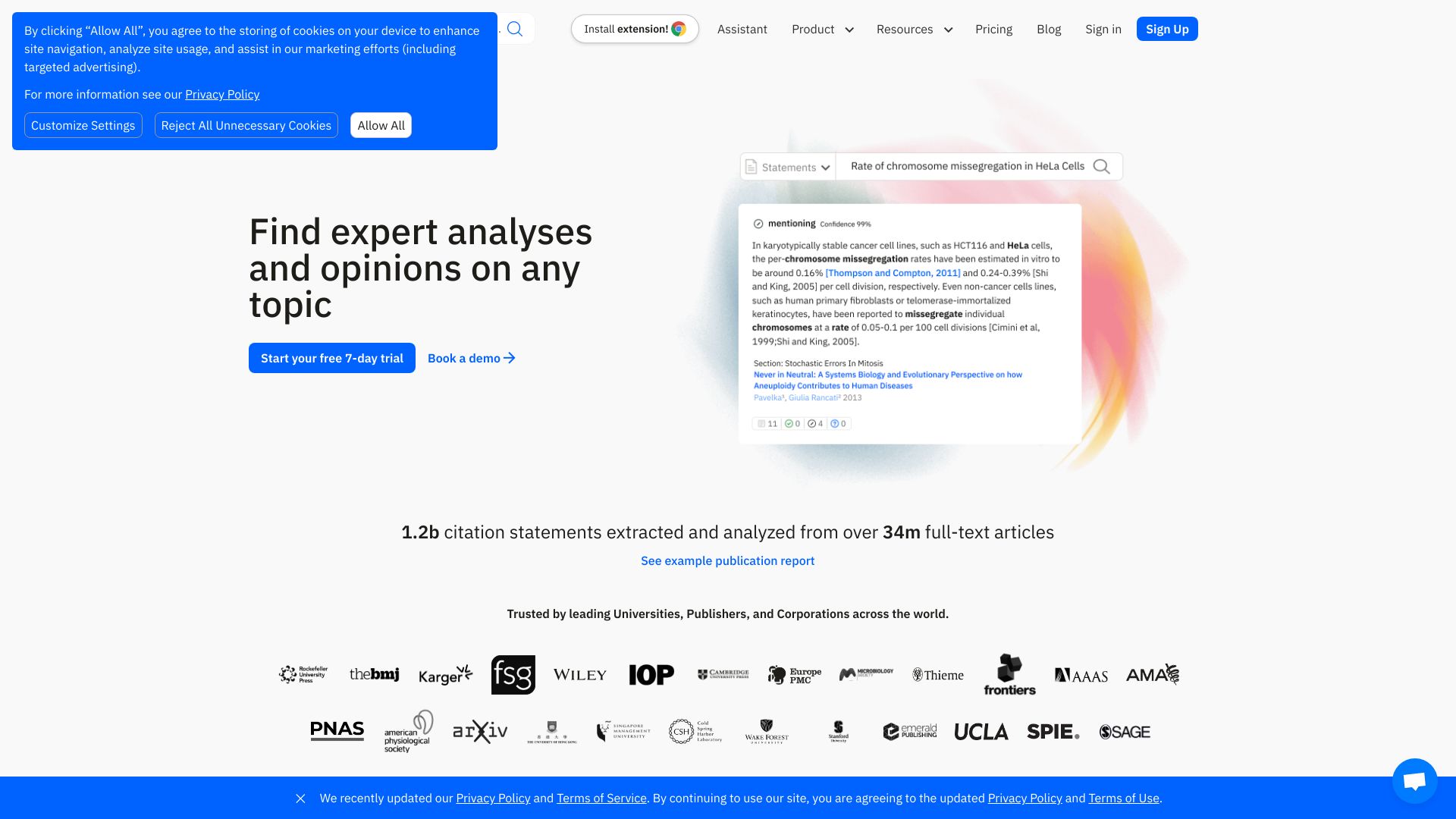- Home
- AI Checker
- Scite

Scite
Open Website-
Tool Introduction:Explore 1.2B Smart Citations: context, support or contrast.
-
Inclusion Date:Oct 21, 2025
-
Social Media & Email:
Tool Information
What is Scite AI
Scite AI is a research discovery and evaluation platform that shows how scientific articles have been cited, not just how many times. Drawing on 1.2+ billion Smart Citations, it classifies whether a reference provides supporting, contrasting, or neutral mention and reveals the exact citation context. By surfacing expert commentary, editorial notices, and citation patterns, Scite AI helps researchers quickly judge reliability, map debates, and find trustworthy evidence for literature reviews, grant proposals, peer review, and data-driven R&D decisions.
Scite AI Main Features
- Smart Citations with context: View the sentences around each citation to understand why a paper was cited and whether it supports or challenges a claim.
- Support/contrast classification: Machine learning labels citations as supporting, contrasting, or mentioning to speed up evidence appraisal.
- Powerful literature search: Search across 1.2B+ citation statements and filter by citation type, section, publication year, journal, author, and more.
- Citation network insights: Explore how papers relate via interactive citation graphs to identify seminal works and competing viewpoints.
- Quality and integrity signals: See editorial notices and retraction flags to avoid unreliable sources during review.
- Alerts and collections: Save papers, build reading lists, and set alerts for new supporting or contrasting evidence.
- Browser extension and workflow integrations: Surface Smart Citations on publisher pages and connect with reference workflows.
- APIs and dashboards: Programmatically query Smart Citations and access analytics for publishers, institutions, and teams.
Scite AI Suitable For
Scite AI suits academics, graduate students, and librarians conducting literature reviews; journal editors and peer reviewers evaluating submissions; R&D teams in biotech, pharma, and tech vetting evidence; policy analysts and healthcare professionals appraising studies; and anyone needing fast, context-rich citation analysis to assess the strength of scientific claims.
Scite AI Usage Steps
- Create an account and set your research interests to tailor recommendations and alerts.
- Search by keyword, DOI, title, or author to find relevant articles and citation statements.
- Open an article page to review Smart Citations, reading the highlighted context sentences.
- Filter by supporting, contrasting, or mentioning to triage evidence quality and direction.
- Save key papers to collections, export references, or share reports with collaborators.
- Install the browser extension to view Smart Citations directly on publisher and preprint pages.
- Optionally use the API or institutional dashboard to integrate citation data into workflows.
Scite AI Industry Use Cases
University librarians use Scite AI to teach evidence appraisal and guide systematic reviews. Journal editorial offices screen submissions with citation context and integrity signals. Pharmaceutical R&D teams assess targets by quickly locating supporting and contradicting studies. Policy units vet citations in briefing documents to ensure claims are backed by robust evidence. Publishers embed citation context badges to enrich article pages and inform readers.
Scite AI Pricing
Scite AI offers a free tier with limited features and paid subscriptions for individuals and organizations, available on monthly or annual billing. Institutional plans provide broader access, dashboards, and administration features, while API access is available under separate, usage-based terms. Trials or demos are typically available for teams and institutions.
Scite AI Pros and Cons
Pros:
- Reveals citation context and direction (supporting vs. contrasting) for faster, deeper evaluation.
- Large, continuously growing coverage of Smart Citations across disciplines.
- Quality and integrity signals help avoid retracted or disputed sources.
- Efficient filters, alerts, and collections streamline literature reviews.
- Integrations and APIs enable scalable, programmatic citation analysis.
Cons:
- Classification can occasionally mislabel complex statements; human judgment remains essential.
- Coverage varies by field and publication type; not every article has rich citation context.
- Some advanced features and API access require paid plans.
- Learning curve for users new to context-based citation analysis.
Scite AI FAQs
Q1: How does Scite AI determine if a citation is supporting or contrasting?
It applies natural language processing and machine learning to the citation context, classifying statements as supporting, contrasting, or mentioning. Users can read the exact sentences to verify the classification.
Q2: What sources does Scite AI index?
Scite AI aggregates citation data from a wide range of scholarly sources and publisher content, enabling search over 1.2B+ Smart Citations across disciplines.
Q3: Does Scite AI replace peer review?
No. It complements peer review by making evidence relationships transparent and faster to assess, but expert evaluation remains necessary.
Q4: Is there an API?
Yes. Developers and organizations can access Smart Citations and analytics via API under separate terms.






